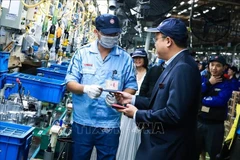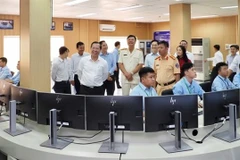Hanoi (VNS/VNA) - The post-Tet (Lunar New Year) labour market is predicted to witness many significant changes, with opportunities and challenges intertwined for both businesses and employees, according to experts.
This is an important time for both sides to grasp trends and develop appropriate strategies to maximise potential.
After the Lunar New Year, workers frequently wish to switch workplaces and search for better employment possibilities, according to experts.
In order to make up for the shortages caused by resignations or job changes in the last months of the year, businesses typically hire extra employees. For job seekers, particularly those with specialised talents or experience, the labour market is now opening up a wide range of choices.
Surveys conducted by human resource organisations indicate that jobs like technology technicians, salespeople and manual labourers will be the most in-demand, the Voice of Vietnam (VOV) reported.
This comes from the demand to expand the business scale of enterprises and the digital transformation that is taking place strongly in many places.
It is anticipated that the technology, renewable energy and logistics sectors would continue to expand rapidly in 2025.
Vu Quang Thanh, Deputy Director of the Hanoi Employment Service Centre, said at the end of 2024 and the beginning of 2025, the recruitment demand in the capital market is quite vibrant. Businesses operating in express delivery services, restaurant – hotel business, trade – production are in need of recruiting a lot of workers to serve the peak demand at the Lunar New Year holiday and in the first months of the new year.
The Ministry of Labour, Invalids and Social Affairs assessed that there will be a labour shortage in important areas, where many industrial parks and export processing zones are concentrated.
Some big businesses had extra orders to fulfil for the year-end holidays, but they neglected to prepare for the human resource, which resulted in a scarcity of employees, primarily unskilled workers in the electronics assembly and textile and apparel industries.
Associate Professor Dinh Trong Thinh, from the Academy of Finance, said the labour market has shown positivity at the beginning of this year with many businesses attracting a large number of workers and the expansion of production activities.
“The labour market’s development remains complicated and will face many challenges. Due to the State apparatus streamlining policy, a large number of public sector employees will have to look for jobs. This is not an easy task, especially for the elderly workforce,” he told VOV.
He believes the export of goods is experiencing some challenges, which would have a big impact on the labour market.
Hopefully, businesses will see an improvement in orders in February and March, which will lead to a stable labour market, he added.
In 2025, the issue of labour supply and demand is somewhat complex. The supply is increasing significantly, which is one of the important factors that makes the labour market more flexible and competitive.
If production and business continue to be strongly expanded, the labour supply will be matched by the market demand, he said.
But if the production and business expansion remains at a moderate level, the labour force will be excessive and it will be more challenging for workers to find jobs, he said.
Nguyen Thi Thanh Mai, Deputy Director of the Population and Labour Statistics Department under the General Statistics Office, said although the labour market is still recovering, there are still many issues with the quality of the labour supply, which prevents it from meeting the demands of a contemporary, flexible, sustainable and interconnected labour market.
She cited that the country still has 71.4% of untrained workers with no certificates. Employed workers tend to increase, but the labour market is not developing sustainably when the number of informal workers doing unstable jobs still accounts for a large proportion, about more than three fifths of the total number of employed workers in the country.
According to experts, the labour market will have to deal with numerous significant changes in working forms, recruitment needs, and skill requirements as a result of the rapid advancement of technology and digital transformation.
In order to adapt, workers must enhance their knowledge and abilities and get ready for change. To keep talent and encourage long-term success, businesses must also concentrate on creating an appealing workplace./.




























